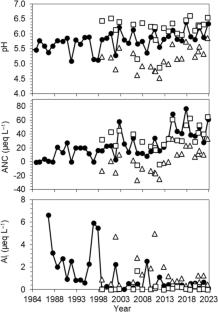Brown Trout Natural Colonisation as a Sign of Full Lake Recovery from Acidification
Abstract
A recent spontaneous return of a native brown trout population in Lake Laka and its tributaries followed the gradual recovery of the Bohemian Forest (Czechia) from atmospheric acidification. The lake had hosted a vibrant brown trout population in the first half of the 20th century, which then became extinct around the 1960s due to strong atmospheric acidification, peaking in the 1980s. However, since the 1990s, a gradual reversibility in acidification has occurred. This positive trend was delayed after tree dieback in the lake catchment in the 2000s. The following detailed monitoring showed recurrent critical periods of low pH and ANC, and elevated concentrations of ionic Al. This was especially in spring, lasting until the late 2010s. Electrofishing from 2020 to 2022 indicated suitable conditions for permanent fish populations. In comparison to previous electrofishing (2005–2010), brown trout colonised Lake Laka and formed a stable population in the lake outflow. Downstream of the lake, the fish abundance remained similar to those some ten years earlier. In contrast to the brown trout, the bullhead was only found in the stream below the lake, as it was unable to migrate to the upper areas due to natural barriers. The recovery of the brown trout population in Lake Laka after the acidification phase is an example of the successful restoration of a disturbed aquatic ecosystem under pristine conditions.


 求助内容:
求助内容: 应助结果提醒方式:
应助结果提醒方式:


